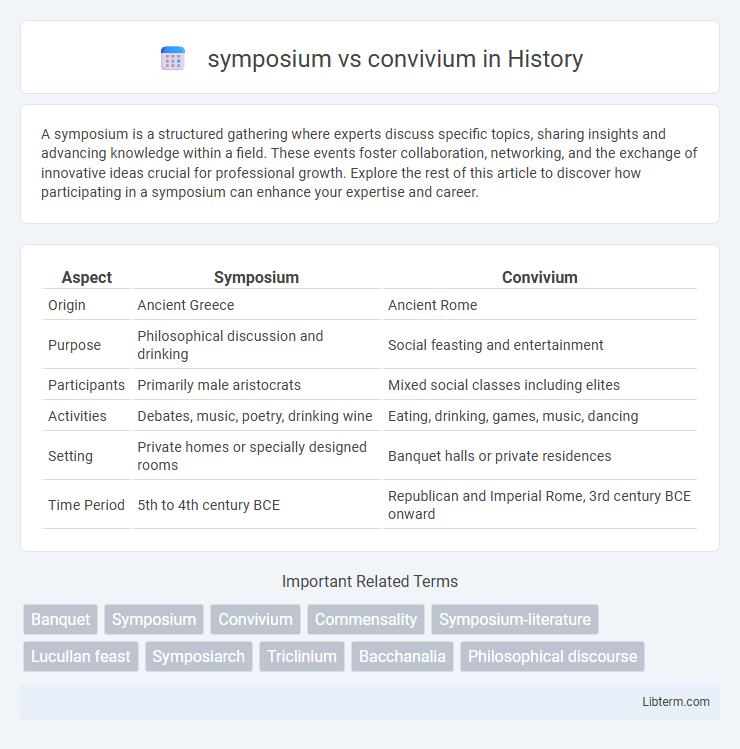A symposium is a structured gathering where experts discuss specific topics, sharing insights and advancing knowledge within a field. These events foster collaboration, networking, and the exchange of innovative ideas crucial for professional growth. Explore the rest of this article to discover how participating in a symposium can enhance your expertise and career.
Table of Comparison
| Aspect | Symposium | Convivium |
|---|---|---|
| Origin | Ancient Greece | Ancient Rome |
| Purpose | Philosophical discussion and drinking | Social feasting and entertainment |
| Participants | Primarily male aristocrats | Mixed social classes including elites |
| Activities | Debates, music, poetry, drinking wine | Eating, drinking, games, music, dancing |
| Setting | Private homes or specially designed rooms | Banquet halls or private residences |
| Time Period | 5th to 4th century BCE | Republican and Imperial Rome, 3rd century BCE onward |
Introduction: Defining Symposium and Convivium
A symposium in ancient Greek culture was a formal gathering centered on intellectual discussion and philosophical debate, often accompanied by wine and entertainment. In contrast, a convivium referred to a Roman banquet emphasizing lavish dining and social enjoyment rather than structured discourse. Both events served as key social institutions reflecting their respective cultures' values on community, knowledge, and leisure.
Historical Origins of Symposium
The symposium originated in ancient Greece as a formal gathering for intellectual discussion and drinking, primarily among male aristocrats, serving as a setting for philosophical dialogue and social bonding. It often featured ritualized drinking games, poetry, music, and debates that reinforced communal values and elite status. In contrast, the convivium, rooted in Roman culture, emphasized communal dining and convivial entertainment, reflecting broader social inclusivity and the integration of social hierarchies through shared meals.
Historical Roots of Convivium
The convivium traces its origins to ancient Roman society, where it functioned as a communal feast fostering social bonds, intellectual discourse, and political alliances among participants. Unlike the Greek symposium, which emphasized structured philosophical debate accompanied by drinking, the convivium centered on shared meals and cultural rituals that reflected Roman values of camaraderie and hierarchy. These historical roots reveal the convivium as a foundational institution shaping social interactions and elite cohesion in Roman civilization.
Cultural Context: Greek vs Roman Traditions
The symposium in Greek culture was a ritualized gathering centered around intellectual discourse, poetry, and philosophy, reflecting the Greeks' emphasis on communal wisdom and democratic ideals. In contrast, the Roman convivium emphasized social hierarchy, political networking, and gastronomic pleasure, serving as a display of wealth and status within the Roman elite. These differing cultural contexts highlight how the symposium fostered egalitarian camaraderie, while the convivium reinforced structured social order in their respective societies.
Structure and Rituals of a Symposium
The structure of a symposium traditionally involves a series of drinking parties where selected participants engage in intellectual conversations, often following a formal sequence of toasts and libations led by a symposiarch. Rituals include reclining on couches, drinking diluted wine, and reciting poetry or philosophical debates, emphasizing a controlled but convivial atmosphere. Unlike the convivium, which centers more on communal dining, the symposium prioritizes structured dialogue and ceremonial drinking practices.
Structure and Rituals of a Convivium
A convivium, rooted in ancient Roman tradition, is a structured banquet emphasizing social harmony through shared meals, drinking, and conversation, typically held in private homes. Rituals include specific seating arrangements to denote social status, the serving of multiple courses paired with wine, and the incorporation of entertainment such as poetry or music to enhance communal bonding. The convivium's formalized customs contrast with the Greek symposium's focus on intellectual discourse and competitive games, highlighting the convivium's role in reinforcing societal hierarchies and convivial engagement.
Social Roles and Participants
A symposium in ancient Greece primarily involved elite male participants who engaged in intellectual discussions and philosophical debates, reflecting their social status and education. In contrast, a convivium was a more inclusive social gathering where participants from various social classes shared food and entertainment, emphasizing communal bonding rather than intellectual discourse. The distinct social roles in a symposium fostered hierarchical interactions, while the convivium promoted collective participation and egalitarian social engagement.
Food, Drink, and Entertainment in Each Gathering
A symposium in ancient Greece emphasized intellectual discourse accompanied by wine drinking, where participants reclined on couches and enjoyed delicate appetizers like olives, cheese, and bread, with music or poetry enhancing the atmosphere. In contrast, a convivium in Roman culture centered more on lavish feasts with multiple courses of rich foods such as roasted meats, seafood, and exotic fruits, paired with copious wine servings and lively entertainment including dancers, musicians, and theatrical performances. While both gatherings celebrated food, drink, and entertainment, symposia prioritized philosophical conversation with moderate drinking, whereas convivium events focused on extravagant dining and dynamic social festivities.
Philosophical and Social Significance
The symposium in ancient Greece functioned as a structured forum for philosophical discourse, fostering critical thinking and intellectual exchange among participants, often centered around themes such as ethics, politics, and metaphysics. In contrast, the convivium, with its more relaxed and convivial atmosphere, emphasized social bonding and communal harmony through shared meals and entertainment, reflecting cultural values around hospitality and friendship. Both gatherings played pivotal roles in shaping social cohesion and philosophical thought, with the symposium prioritizing rational debate and the convivium enhancing interpersonal relationships within the polis.
Lasting Legacy and Modern Interpretations
The symposium, originating in ancient Greece, left a lasting legacy as an intellectual and social gathering focused on philosophical discourse and cultural refinement, influencing Western notions of dialogue and debate. The convivium, rooted in Roman tradition, emphasized conviviality and collective enjoyment, shaping contemporary ideas about communal dining and social bonding. Modern interpretations revive symposiums as academic conferences and conviviums as celebratory feasts, both reflecting enduring principles of fellowship and shared knowledge.
symposium Infographic

 libterm.com
libterm.com